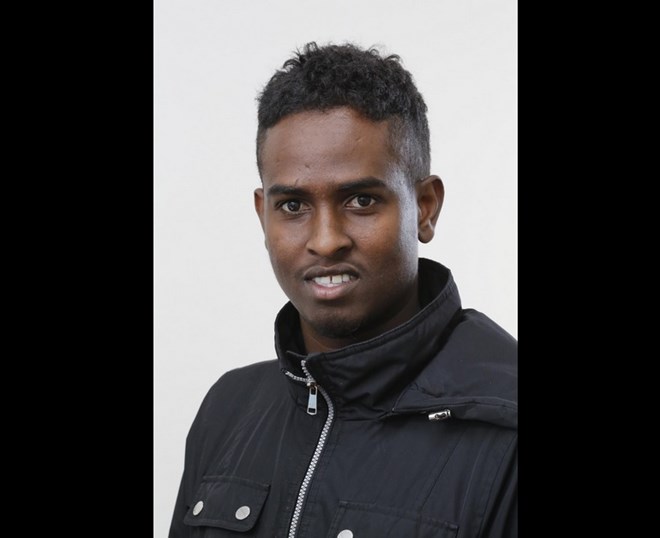Columbus Disptach
Friday January 26, 2018
By Jessica Wehrman

Afkab Hussein
WASHINGTON — When Afkab Hussein decided to tell a room packed full of House and Senate staffers Thursday how the 2017 Muslim and refugee bans affected him, the Somali native brought with him a translator to help tell his story.
In the end, though, in a quiet voice that had only spoken English for a little more than two years, the North Side resident decided he needed to tell his story himself.
Hussein, 30, came to the United States in September 2015, after spending most of his life in a refugee camp in Kenya. He left behind a pregnant wife. In 2016, his wife, Rhodo, and son, Abdullahi, were cleared to come to the United States, but before they could get here, President Donald Trump issued an executive order that banned all refugee admissions and temporarily halted travel from seven majority-Muslim countries, including Somalia.
That ban was overturned, but a second executive order has effectively kept Hussein and his family in limbo.
Now, Hussein is in Washington on the one-year anniversary of the original ban, telling anyone who will listen how the policy has impacted his family. On Saturday, he’ll be part of a protest in front of the White House — yet another plea aimed at bringing his family to the United States.
Hussein is a plaintiff in a class–action lawsuit fighting the second travel ban that barred the entry of refugees from 11 countries — nine majority Muslim. Refugees are typically permitted into the United States legally because they fear persecution based on race, religion, nationality or political opinions.
Trump has argued that the refugee program is vulnerable to being abused by terrorists. Under his administration, Trump has set a refugee admissions ceiling of 45,000 for this fiscal year. So far, they’re on pace to accept some 15,000 refugees — far lower than the threshold set.
“This is historically low,” said Adam Bates, policy council for the International Refugee Assistance Program.
The translator who accompanied Hussein, Sowdo Mohamud, also of Columbus, had her own story. She came to Ohio five years ago, but even before that, she knew she wanted to be in Ohio: While waiting to come to the United States in 2010, she’d met a doctoral student from Ohio State who told her glowingly about the state.
“I had a Buckeye necklace even before I knew what a Buckeye was,” she said in an interview. She still remembers watching her first OSU football game; she thought it was rugby until her friends set her straight.
“I knew Columbus would be my home from the get-go,” she said.
Mohamud, who became a U.S. citizen Tuesday, said the refugee ban hurt her, too; she had hoped to bring some of her family to be with her in Columbus but found those hopes dashed. More directly, it cost her work: She’d been a caseworker for Somalis coming into the United States. Without refugees, there was no one to help.
She said she and the Somali community she represents have played by the rules. They came legally, going through intense scrutiny to get here. They have jobs. They contribute.
“I always looked forward to coming here and being a part of this country,” she said. But the ban made her feel as if that feeling was not reciprocated.
For Hussein, who works as a long-haul trucker, the problem is stark: He has yet to hold his boy, now 2.
Instead, on his drives across the country that he now calls home, he will occasionally pull out his phone and kiss the photo of the wide–eyed toddler staring back from his home screen. He’ll call Rhodo and the two will talk for hours as the states pass by through his truck window.
Since he’s lived in the United States, he’s been able to send them the money to move to Nairobi. Still, the two can’t stay in Kenya. They remain refugees.
“If they came here, I’d feel very happy,” he said.